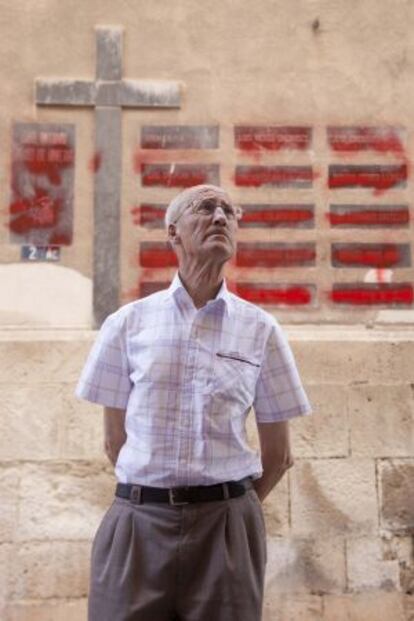Retiree facing charges for vandalizing Franco-era plaques
Law requiring their removal is not being enforced, he says


The police caught him literally red-handed. José Gallego, 72, was on top of a ladder spraying red paint over plaques honoring the Franco regime located at a church in his native town Aspe, in Alicante province.
"The police told me what I was doing was illegal, and I told them that it was illegal to leave them there because the Law of Historical Memory requires that Franco-era symbols must be taken down," he explained.
Gallego, a retired mechanic, now faces charges of vandalizing historic and cultural heritage.
This wasn't his first such action. He recalls with a certain pride that at a local school he also vandalized a plaque honoring General José Moscardó Ituarte, the military governor of Toledo province during the Civil War. "I did it because I was tired of waiting. In July 2009, I asked the mayor, Nieves Martínez of the Popular Party (PP), to take down all the Franco-era symbols. She told me that she didn't think that there were any in the town. I showed her where they were and she said she would have them taken down. But her term ended and nothing happened. Afterwards, the Socialists and United Left (IU) began their joint administration and still nothing has happened. I grew tired."
Gallego doesn't regret what he did, even though he is facing between one and three years in jail, as well as having to pay for the damage he caused.
"All of this has unnerved me. I have a weak heart and cannot sleep. When I walk down the street, some people shout ' ¡Ole! , You've got a lot of balls!' Others call me a 'Red'."
The family of Gallego did not suffer any direct persecution against his family during the Franco era, but he does explain that he was arrested on various occasions when he took part in marches against the regime. He has been a Socialist Party member since 1974.
"I feel a bit betrayed," he says. "I cannot understand why the current Socialist mayor doesn't observe a law that was passed by a Socialist government. I think they are very much afraid of the Church. I didn't touch the crucifix that is the center of where the plaques are displayed because I didn't want to set off any type of religious anger.
"But 36 years after Franco's death this cannot be. You go to Germany and you will not find a single symbol of Hitler's regime, but Spain is full of them. Why is there so much resistance?"
Tu suscripción se está usando en otro dispositivo
¿Quieres añadir otro usuario a tu suscripción?
Si continúas leyendo en este dispositivo, no se podrá leer en el otro.
FlechaTu suscripción se está usando en otro dispositivo y solo puedes acceder a EL PAÍS desde un dispositivo a la vez.
Si quieres compartir tu cuenta, cambia tu suscripción a la modalidad Premium, así podrás añadir otro usuario. Cada uno accederá con su propia cuenta de email, lo que os permitirá personalizar vuestra experiencia en EL PAÍS.
¿Tienes una suscripción de empresa? Accede aquí para contratar más cuentas.
En el caso de no saber quién está usando tu cuenta, te recomendamos cambiar tu contraseña aquí.
Si decides continuar compartiendo tu cuenta, este mensaje se mostrará en tu dispositivo y en el de la otra persona que está usando tu cuenta de forma indefinida, afectando a tu experiencia de lectura. Puedes consultar aquí los términos y condiciones de la suscripción digital.








































